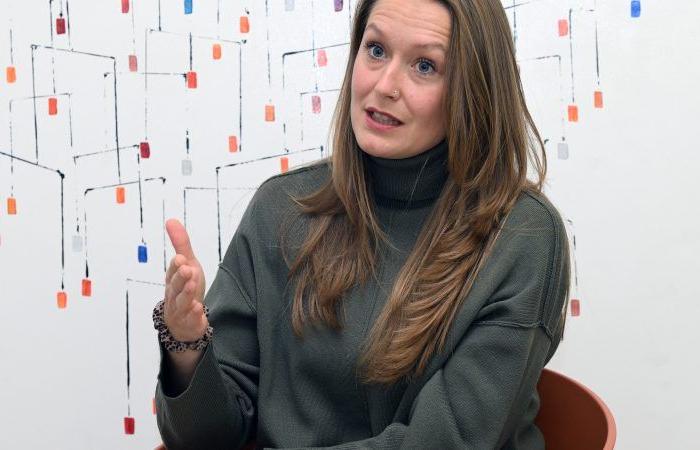In Luxembourg, the needs for ADHD care far exceed the available resources. At the Attention Clinic, admissions have been suspended for 18 months, while the SCAP is overflowing.
Still poorly understood, or even described as a “fashionable diagnosis”, attention deficit disorder with or without hyperactivity (ADHD) is struggling to be properly managed. However, knowledge on this disorder of neurological origin affecting 6% of children and nearly 3% of adults is today solid.
Neuropsychologist Estelle Thilgen, who launched the Attention Clinic – a team of five people – within the Ettelbruck CHNP in 2021, sweeps away prejudices and invites us to change the way we look at this disorder.
What do we know about ADHD today?
Estelle Thilgen: For a long time, only hyperactivity was taken into account, but it is now established that ADHD covers a range of executive function disorders. Those we use every day to carry out tasks, plan, sequence, prioritize, make decisions, be flexible or anticipate.
And it includes neurobiological dysregulation which causes difficulties in attention, concentration, organization and time management. We know that heredity is involved and that multiple factors influence the symptoms and severity. Education has nothing to do with it! The biological origin is beyond doubt. ADHD also appears on imaging when we analyze the MRIs of a given group: the structuring of the brain, like the activation of the areas, turns out to be different.
Concretely, what is happening in the brain?
In fact, people with ADHD can concentrate. Sometimes even in an intense and prolonged way – what we call hyperfocus – when they are interested in a subject. They simply have difficulty controlling their attention, a bit as if they were not in control.
Their prefrontal cortex, responsible for executive functions and self-regulation, slows down due to a lack of dopamine. Hence great distractibility or impulsivity or hyperactivity, three signs of ADHD.
However, these people have enormous potential, they are atypical! While some of their symptoms can be debilitating, they have plenty of skills that are truly out of the ordinary.
Ces « symptoms« are actually characteristics and qualities that are expressed in extreme ways. The treatment also serves to make all this potential more accessible. These people have incredible abilities to solve problems, think « out of the box« they have a different perception of things and are 200% involved in the areas they love.
Can ADHD progress?
Symptoms are present from childhood and persist into adulthood. Above all, it is their impact that will evolve, with age, and according to life situations. An ADHD person who lives alone can manage their difficulties well.
On the other hand, things can get complicated as a couple, at work, or when becoming a parent, faced with new responsibilities. There, ADHD can become a handicap on a daily basis. Which then prompts consultation.
Workshops in four high schools
The Aldic association, which promotes initiatives in the fields of youth, culture, arts and education, also focuses on ADHD, through its “ADHD Unmasked” project. Designed with a psychologist, it is available in several workshops including role-playing games, simulations, and even sensory stations.
Objectives: break down prejudices, encourage early detection of ADHD, provide information on the different characteristics of ADHD and their manifestations depending on gender. From December until next June, the team will visit different high schools in the capital – four already fixed – to raise awareness of ADHD among students, parents and teachers.
Interested establishments can write to [email protected].
We hear that ADHD is « a fashion« . Is this what you see?
No way. Our figures reveal that 80% of people who come to us have their ADHD diagnosis subsequently confirmed. Often, they have reached such a level of difficulty that they are desperate for help.
If the demand is enormous today, it is mainly because, before 2021 and the creation of our clinic, no service treated ADHD in adults in Luxembourg.
Is it this strong demand that led to suspension of admissions?
Yes. A year and a half ago, we had to close the waiting list, knowing that we do not have sufficient resources to cope, and that some people have already been waiting for two years. We have been in an active recruitment phase for several months, in order to compose a multidisciplinary team that we hope to bring together in 2025. We have only just welcomed a new psychologist this week.
Who should you contact then?
You can contact private practices, or contact the Treffpunkt ADHS, which brings together volunteer ADHD specialists, of which I am a member, and raises public awareness. Here too, we are overwhelmed by requests for information and referral to professionals. This is a trend that we observe everywhere, not just in Luxembourg.
How is ADHD treated?
The treatment is very effective. It includes the administration of a medication, methylphenidate, and coaching to learn how to better manage your ADHD. Psychoeducation allows you to know how your brain works and how to motivate it, thanks to compensation strategies.
The drug is a psychostimulant which will better use available dopamine so that the prefrontal cortex functions well. Which also has a protective effect, because it prevents people from seeking stimulation from addictions: alcohol, drugs, sugar, games, risk-seeking, etc.
Are doctors properly trained?
No, unfortunately, there is still a lot of information work to be done to better understand what ADHD is in people’s daily lives, how it manifests itself at different ages, and the forms it takes in women. . There are a lot of misconceptions.
Patients have been told that they could not have ADHD because they had done well in school, for example. We organize events dedicated to health professionals, and they have had some success. We observe a real desire to train on the subject.
attention.lu
More than 1,000 requests this year
At SCAP, capable of supporting 150 to 200 children per year, the situation is increasingly tense.
As for the care of children with ADHD, centralized at the Consultation and Support Service for Attention, Perception and Psychomotor Development Disorders (SCAP), the situation is becoming critical. The team is doing everything possible to absorb new requests, but lacks resources.
While in 2023, the SCAP had 400 to 500 applications for admission, these jumped to more than 1,000 this year. Well beyond the 150 to 200 families the team is capable of caring for. “We decided to no longer maintain a waiting list, but to open admissions once a quarter. In a few minutes, all the places are snapped up,” explains SCAP deputy director Eva Bodenröder.
Faced with this surge, coupled with the difficulty of recruiting staff – the psychosocial sector is hit by a serious labor shortage – the service is trying to adapt as best it can. “We are always looking for additional staff, and we are also in the process of rethinking our concept, seeing which therapies have the most impact, but that takes time.” In the meantime, parents can always contact SCAP for valuable advice and guidance.
Discussion evenings open to all are also organized regularly so that families can chat with the team and feel less alone. The next meeting dedicated to concentration disorders in children is scheduled for Tuesday, November 12, at 6 p.m. at SCAP, 21 rue Léon-Laval in Leudelange (online registration).
scap.lu






